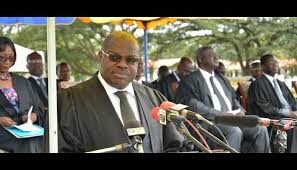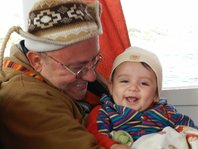 I came to America from Nigeria with my family when I was 18, leaving behind a country amid recovery after an apocalyptic civil war that cost over a million lives. I saw our government changing hands repeatedly through military coups. While many in Nigeria at the time saw emigration to another country to further oneself as being a sign of luxury and wealth, this was not the case with us. My parents, hard-working, honorable, wonderful people, were poor and illiterate, having never attended school. I resolved that my apparent sacrifices for me would never be in vain. I adopted their standards of how to conduct yourself in life, to be disciplined, persistent in your pursuits, and above all t,o work hard at everything you do.
I came to America from Nigeria with my family when I was 18, leaving behind a country amid recovery after an apocalyptic civil war that cost over a million lives. I saw our government changing hands repeatedly through military coups. While many in Nigeria at the time saw emigration to another country to further oneself as being a sign of luxury and wealth, this was not the case with us. My parents, hard-working, honorable, wonderful people, were poor and illiterate, having never attended school. I resolved that my apparent sacrifices for me would never be in vain. I adopted their standards of how to conduct yourself in life, to be disciplined, persistent in your pursuits, and above all t,o work hard at everything you do.
While in high school, I read The Power of Positive Thinking by Norman Vincent Peale. This book spoke to me, and reading it was a defining moment, particularly the development of my exams for success in life: You can, f you think you can. Seven simple words. I wrote those words down in bold letters and set them beside my bed. To this day, I have lived this motto, never accepting or listening to others who tried to reign in my aspirations, never giving in to the naysayers. Whenever I can, I tell people they have no limitations except those they choose to impose upon themselves.
I worked for five years as an accounting administrative assistant before I caconcludedhat this was not my life's work. I had no passion for this type of work, and I wanted a piece that would offer me the chance to learn. It occurred to me that no other job provides gra eater opportunity for lilifelongearning than teaching. Thus, I resolved to become an educator. My research interests include, but are not limited to, Urban Education in America, particularly bridging the alleged educational achievement gap. The question immediately arises: Does his hole genuinely exist, or is it a synthetic concept created to achieve the author's aims, or whom the author represents a particular interest group, politician, or leader in education. ?t is my aim to explore this concept and critically examine its validity. This concept has been a part of the discussion for some time now, fifty years, and can be traced to Brown vs. the Board of Education. Ever since the desegregation of schools in the United States, there has been this issue of the achievement gap between the races, which was later shown to be at least partially socio-economically based.
I am most engaged with the to address this educational achievement gap. What creative remedies can be developed? Money is ofoftenne of the most significant issues. One could argue that while a bipartisan No Child Left Behind Act is in place, the continued avoidance of federal income taxes by America's largest corporations is tying the hands of the federal government. What kind of expenditure would be necessary, er student, to remedy the achievement gap? Is it rest a question of money? I want to explore these complex questions.
Perhaps it is the digital divide that is the crucial deciding factor. If a school system in not offer a student body the requisite information technology, how are they to compete in the national arena n this golden age of information? This would indicate that it is not the fault of the teachers or the students but the technology that is lacking in school systems. The digital divide spills over into library systems and even the home. A school with online education tracking software for the parent is who helpful technology, but how can a parent who does not have a computer or Internet access utilize such a tool? And a library system that charges for printouts is a hardship for children or parents with little or no money. These are the sorts of issues that need to be addressed and resolved if socioeconomically depressed inner city school children are to succeed. We live in a society that speaks of equal opportunities. Students need to be given an equal chance of success.
For nearly a decade, I have experienced the joys of classroom teaching. ThInterpersonalnteraction with young adults is overwhelmingly and intrinsically rewarding. I believe that I have exhausted every possible avenue of promotion within my current career. I have met every call with an open mind and increasing professionalism and effectiveness. Over the years, I have wanted more from my job, and I need new challenges, which is why I hope to be accepted to your program.
I have long been an advocate for young adults since they bear the brunt of many stigmas. Yet I have found that being a classroom teacher limits my abilities as an advocate for young adults. I want to do more for teens, and I believe that I can do more, and on a larger scale, by entering into a course of study that focuses on the issues of administrative leadership and social justice in education for K-12 students and beyond. A doctoral degree in urban administration will equip me with the requisite tools to tackle the most fundamental problems in the American school system, going to the roots of the issues lining the hands of many dedicated teachers in inner-city schools. With my extensive background as an inner city educator and solid foundation in urban studies, this is a natural progression for me. My drive and mission will lead me to achieve these ideals, and a doctorate will open doors for me to work more effectively foto improve educational systems.
For nearly a decade, I have maintained a conceptual continuity in my professional career. I have dedicated myself to the education of Los Angeles teens as a credentialed high school classroom teacher. This devotion, coupled with my refined approach to my work evoutsidehe the classroom, has made me a successful, efficient, and thorough teacher. While working for Los Angeles school districts, I have achieved a high level of cultural competency, working alongside other educators from around the country with differing heritages. I come from Nigeria, yet I consider myself a Nigerian-American, and brI bring a heritage that I am proud of. Moving to L.A. from Omaha, Nebraska, I have lived and worked in a city that's an enormous population of African-Americans and Hispanics. As an educator, I recognize the need to work with not only students but their parents, as well, creating relationships that'll aid in my ststudent'success. Through these relationships, I have been exposed to the rich tapestry of diverse cultural backgrounds. As a successful educator, I have mastered the basics, devising and planning daily lesson plans, selecting and utilizing appropriate materials, teaching aids, and cocompostingemonstrations that will effectively convey the most fundamental concepts in an assortment of subjects. My aim has always been to provide explanations that are clear and have long-challenged myself to develop increasingly creative approaches to the educational process. I go the extra mile with my students and never shy away from the possibility that some may need further attention or tutoring.
My education began with obtaining my Bachelor's degree in Biology with a minor in Chemistry from the University of XXXX, a school with an excellent national reputation. I became interested in Urban Studies at this point, as I had lived through the racial tensions of the 1970s. Indeed, it was in 1976 that Omaha first began court-ordered integrated busing. I completed my Master's Degree in Urban Studies at XXXX University and later relocated to East Bay, California, where my teaching career began.
I want very much to attend XXXX University because it has a reputation over 80 years in the making. Secondly, XXXX is dedicated to graduate study, specifically. It stands to reason that with 80 years of experience in only graduate study, this makes for a singular and excellent academic background. The university's reputation is not merely for one or two subjects or one particular school ut for providing elite education in the field that I want to explore further: the social sciences. The teteacher-to-studentatio is excellent, with class sizes at an average of 25 students to professor m,aking for an intimate experience, and plenty of room for personalized, one-on-one discussion. The School of Educational Studies represents further specialization within this framework of excellence in teaching. I thank you for considering my application to your esteemed program.

